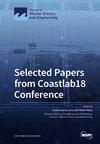An Efficient Autonomous Exploration Framework for Unmanned Surface Vehicles in Unknown Waters
IF 2.8
3区 地球科学
Q1 ENGINEERING, MARINE
引用次数: 0
Abstract
The detection of unknown waters has been studied and applied in various fields, such as national defense, military operations, engineering surveying and mapping, and scene reconstruction. To improve exploration efficiency in unknown waters, this paper proposes a framework for autonomous exploration using unmanned surface vehicles (USVs). This framework, comprising a multi-stage exploration strategy and a hierarchical navigation strategy, is designed to mitigate the inherent restrictions between the exploration target point and exploration direction in USV operations. These two strategies are optimized for the exploration target point and feasible navigation route to address the problem of the USV’s limited mobility during exploration. Rapidly exploring random tree (RRT) and boundary detection methods are used in the local layer to find the boundary in front of and behind the USV, and the gain of the target point is optimized. The hierarchical navigation method is implemented in the global layer to plan appropriate navigation paths. The proposed method is tested in simulations in several virtual environments and contrasted with the conventional methods currently in use. The findings indicate that our strategy covers more ground more effectively than other methods (our method achieved an exploration efficiency ranging from 4.9 to 5.3 m2/s, whereas traditional methods ranged from 2.3 to 3.9 m2/s, which demonstrates that our approach can improve exploration efficiency by up to 200% compared to traditional methods), spending less time exploring while significantly reducing collision probability.未知水域无人水面飞行器的高效自主探索框架
未知水域探测已在国防、军事行动、工程测绘和场景重建等多个领域得到研究和应用。为了提高未知水域的探测效率,本文提出了一种利用无人水面航行器(USV)进行自主探测的框架。该框架由多阶段勘探策略和分层导航策略组成,旨在缓解 USV 作业中勘探目标点和勘探方向之间的固有限制。这两种策略针对勘探目标点和可行的导航路线进行了优化,以解决 USV 在勘探过程中移动能力有限的问题。在局部层中使用快速探索随机树(RRT)和边界检测方法来寻找 USV 前后的边界,并优化目标点的增益。全局层采用分层导航方法规划适当的导航路径。在多个虚拟环境中对所提出的方法进行了模拟测试,并与目前使用的传统方法进行了对比。结果表明,与其他方法相比,我们的策略能更有效地覆盖更多地面(我们的方法实现了 4.9 至 5.3 平方米/秒的探索效率,而传统方法则为 2.3 至 3.9 平方米/秒,这表明与传统方法相比,我们的方法可将探索效率提高 200%),花费更少的探索时间,同时显著降低碰撞概率。
本文章由计算机程序翻译,如有差异,请以英文原文为准。
求助全文
约1分钟内获得全文
求助全文
来源期刊

Journal of Marine Science and Engineering
Engineering-Ocean Engineering
CiteScore
4.40
自引率
20.70%
发文量
1640
审稿时长
18.09 days
期刊介绍:
Journal of Marine Science and Engineering (JMSE; ISSN 2077-1312) is an international, peer-reviewed open access journal which provides an advanced forum for studies related to marine science and engineering. It publishes reviews, research papers and communications. Our aim is to encourage scientists to publish their experimental and theoretical results in as much detail as possible. There is no restriction on the length of the papers. The full experimental details must be provided so that the results can be reproduced. Electronic files and software regarding the full details of the calculation or experimental procedure, if unable to be published in a normal way, can be deposited as supplementary electronic material.
 求助内容:
求助内容: 应助结果提醒方式:
应助结果提醒方式:


